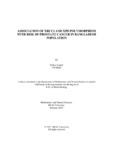Association of XRCC1 and XPD polymorphism with risk of prostate cancer in Bangladesh population
Abstract
This study examined the effects of the X-ray cross-complementing gene 1 (XRCC1) Arg194Trp and Xeroderma pigmentosum group D (XPD) Lys751Gln polymorphisms on the risk, severity, and clinical parameter of prostate cancer in Bangladeshi males. The blood samples and data of 132 prostate cancer patients and 135 healthy controls were obtained. PCR-RFLP was used to conduct a genotype analysis. Compared to the Arg/Arg genotype of XRCC1, the homozygous mutant Trp/Trp genotype was associated with prostate cancer with an Odd Ratio (OR) of 7.50 (95% CI, 1.227-85.12; p=0.04). In comparison to Arg/Arg + Arg/Trp genotypes, the Trp/Trp genotype increased risk by 7.5 folds (OR=7.50; 95% CI=1.23-85.12; p=0.04). XPD variants did not increase prostate cancer risk. Among prostate cancer patients, the XRCC1 Trp/Trp variant was associated with hematuria risk, higher mean serum creatinine, and mean prostate-specific antigen (PSA) levels. Only higher mean serum creatinine levels were associated with the XPD Gln/Gln variant. Tumor grade, tumor aggressiveness, prostate abnormalities, or UTIs were not affected by either XRCC1 or XPD variations (p>0.05).

